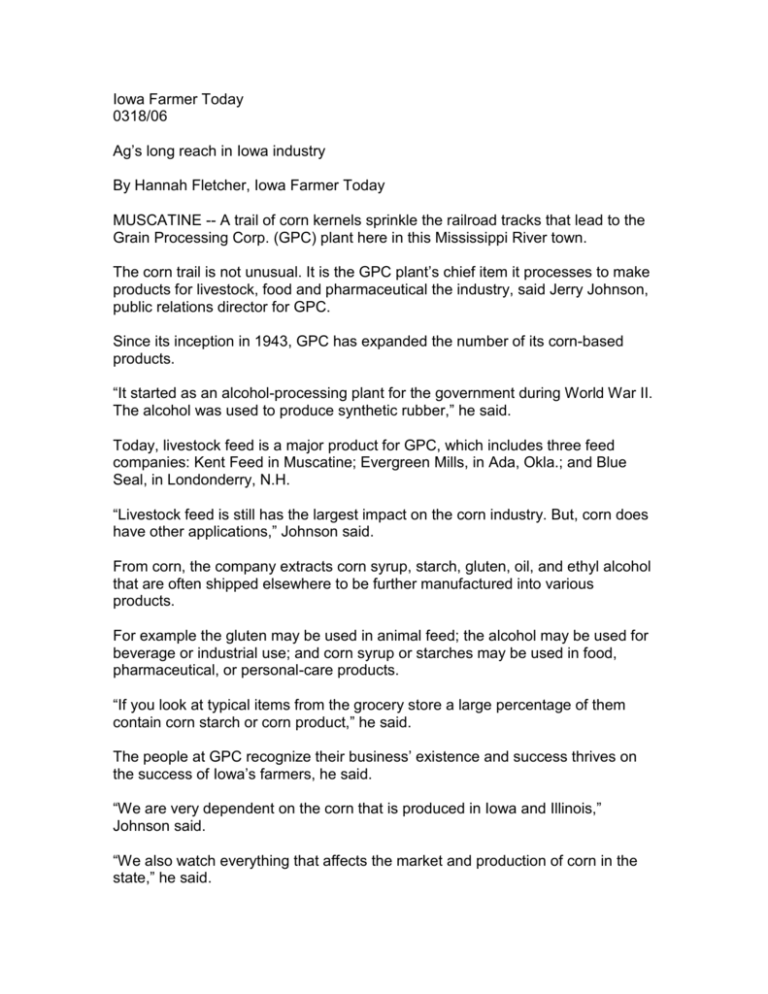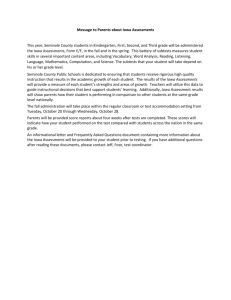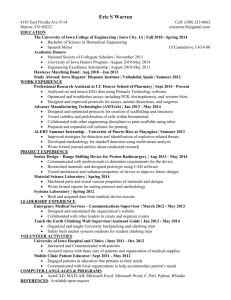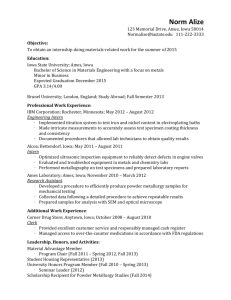agslong - Iowa State University
advertisement

Iowa Farmer Today 0318/06 Ag’s long reach in Iowa industry By Hannah Fletcher, Iowa Farmer Today MUSCATINE -- A trail of corn kernels sprinkle the railroad tracks that lead to the Grain Processing Corp. (GPC) plant here in this Mississippi River town. The corn trail is not unusual. It is the GPC plant’s chief item it processes to make products for livestock, food and pharmaceutical the industry, said Jerry Johnson, public relations director for GPC. Since its inception in 1943, GPC has expanded the number of its corn-based products. “It started as an alcohol-processing plant for the government during World War II. The alcohol was used to produce synthetic rubber,” he said. Today, livestock feed is a major product for GPC, which includes three feed companies: Kent Feed in Muscatine; Evergreen Mills, in Ada, Okla.; and Blue Seal, in Londonderry, N.H. “Livestock feed is still has the largest impact on the corn industry. But, corn does have other applications,” Johnson said. From corn, the company extracts corn syrup, starch, gluten, oil, and ethyl alcohol that are often shipped elsewhere to be further manufactured into various products. For example the gluten may be used in animal feed; the alcohol may be used for beverage or industrial use; and corn syrup or starches may be used in food, pharmaceutical, or personal-care products. “If you look at typical items from the grocery store a large percentage of them contain corn starch or corn product,” he said. The people at GPC recognize their business’ existence and success thrives on the success of Iowa’s farmers, he said. “We are very dependent on the corn that is produced in Iowa and Illinois,” Johnson said. “We also watch everything that affects the market and production of corn in the state,” he said. Johnson said it is easy for people who work for an ag-related business to recognize their dependence on agriculture. Companies, such as GPC, are not unique. “There are a number of agribusinesses that contribute to the health of Iowa’s economy,” said Steve Gehrls, outgoing chairman of the board for the Agribusiness Association of Iowa. “As Iowa is an agricultural state, (agriculture) gets a big chunk of the state’s economy.” Gehrls said it is not unusual for businesses closely linked to agriculture to celebrate when farmers celebrate, he said. “As a farmers’ income increases or the number of bushels and livestock increase, the more they are able to invest in the community and support agribusinesses,” he said. Gehrls, who is also district sales manager for Dow AgroSciences in Des Moines, said farmers are more willing to invest in technology when yields and income are good. “For a farmer to do his job, he relies on the seed industry to provide quality product, the equipment industry to make improvements in technology, the transportation industry to move the grain or livestock, and the financial industry to provide the credit. The list goes on,” he said. Gehrls said some people may be surprised to realize the hold agriculture has on the state’s economy because of the various connections to businesses and the people who work there. According to “The Economic Importance of Agri-Food Industries in Iowa,” a study by Mark Imerman, Iowa State University economist, Iowa food processors generated 4.5 percent or $4.4 billion of Iowa’s Gross State Product — the third highest effect in the nation. Total processing of ag products in Iowa generates 51,071 jobs and labor income of $2.27 billion in Iowa, according to Imerman’s study. “If you stripped away all the businesses that are dependent on agriculture, it would be interesting to see what the state’s economy would look like at the end of the day,” Gehrls said.








